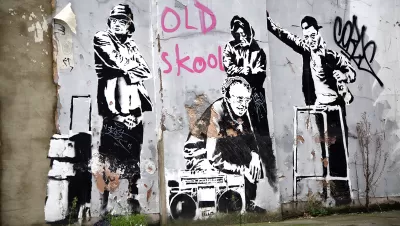A feature article in Marketwatch describes a future for retirement communities that look more like WeWork than the golf course-adjacent exurban communities of the 20th century.

Rachel Koning Beals writes a feature-length article on the evolving priorities of aging seniors exploring the housing market for new kinds of retirement community options.
The current generation of aging Baby Boomers is set to completely redefine the market for retirement communities. Not all of the potential for change for happy reasons, many are facing "financial burdens associated with living longer than prior generations did," according to Beals—a reality "that challenges a U.S. formula for senior housing that hadn’t changed much in decades."
yet, there are reasons for optimism that a new approach to retirement could see benefits for the aging generation. Beals explains:
Yet if the demanding, savvy-consumer baby boomers taking over where their Depression-era parents left off have their say on where and how they live as they age — and geriatrics experts say they do — the era of grin-and-bear-it acquiescence is no more.
Many of today’s best available senior-housing options are really a nod to the past: higher-density locales, homes suited for multiple generations, and community support and stimulation that keeps retirees active and healthy.
Beals notes that many surveys and real estate trends show a back-to-the-city movement for aging seniors, mimicking the preferences of Millennials and Generation Z, but perhaps for different reasons.
Technology is also enabling freedom to live in urban environments like never before: "Technology, especially leveraging the sharing economy, can help satisfy boomers who want to age in place or are rightfully demanding more from their assisted-living options. (Think of services spanning Uber or Lyft rides to in-home wellness programming.)"
FULL STORY: The sharing economy is coming for your retirement

Alabama: Trump Terminates Settlements for Black Communities Harmed By Raw Sewage
Trump deemed the landmark civil rights agreement “illegal DEI and environmental justice policy.”

Planetizen Federal Action Tracker
A weekly monitor of how Trump’s orders and actions are impacting planners and planning in America.

Why Should We Subsidize Public Transportation?
Many public transit agencies face financial stress due to rising costs, declining fare revenue, and declining subsidies. Transit advocates must provide a strong business case for increasing public transit funding.

Understanding Road Diets
An explainer from Momentum highlights the advantages of reducing vehicle lanes in favor of more bike, transit, and pedestrian infrastructure.

New California Law Regulates Warehouse Pollution
A new law tightens building and emissions regulations for large distribution warehouses to mitigate air pollution and traffic in surrounding communities.

Phoenix Announces Opening Date for Light Rail Extension
The South Central extension will connect South Phoenix to downtown and other major hubs starting on June 7.
Urban Design for Planners 1: Software Tools
This six-course series explores essential urban design concepts using open source software and equips planners with the tools they need to participate fully in the urban design process.
Planning for Universal Design
Learn the tools for implementing Universal Design in planning regulations.
Caltrans
Smith Gee Studio
Institute for Housing and Urban Development Studies (IHS)
City of Grandview
Harvard GSD Executive Education
Toledo-Lucas County Plan Commissions
Salt Lake City
NYU Wagner Graduate School of Public Service




























